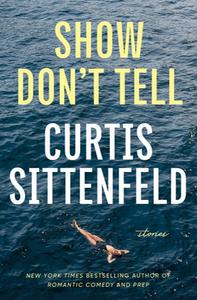
 Show Don't Tell, Curtis Sittenfeld's warm and insightful ninth book (and second story collection after You Think It, I'll Say It), features characters negotiating principles and privilege in midlife as they look back on their youth.
Show Don't Tell, Curtis Sittenfeld's warm and insightful ninth book (and second story collection after You Think It, I'll Say It), features characters negotiating principles and privilege in midlife as they look back on their youth.
Split equally between first- and third-person perspectives, the 12 contemporary stories spotlight everyday marital and parenting challenges. Women weigh the possibility of platonic friendships with men ("A for Alone" and the Covid pandemic-set "The Hug") or seek to behave gracefully toward an ex's family ("The Patron Saints of Middle Age"). Several stories, such as "White Women LOL," question the sense of entitlement that leads to casual racism.
Sittenfield (American Wife; Eligible; Romantic Comedy) uses dual timelines in her stories, offering her characters opportunities for hindsight on events of decades ago. College and boarding school experiences, in particular, are pivotal. "Lost but Not Forgotten" treats fans of Sittenfeld's debut novel, Prep, to a mini sequel: Lee Fiora, at Ault School in Massachusetts for her class's 30th reunion, remembers a brush with a pop idol and wonders if there's romance to be found after divorce.
"Show, don't tell" is a well-known creative writing dictum, and in the title story, Ruthie and her writing program peers nervously await news of Peaslee fellowships and attend a talk by an alumnus turned cult writer. Twenty years later, Ruthie is a thriving women's fiction author, but when she encounters a phenomenally successful but insufferable former classmate, she asks herself whether fame gets distributed fairly.
The arbitrary nature of wealth and celebrity is a central theme of the collection. In one standout, "The Marriage Clock," film producer Heather tries to convince Brock Lewis, author of a bestselling self-help guide, to okay a same-sex couple appearing in his book's movie adaptation. Given his conservative Christian values, Brock surprises Heather by being down-to-earth--and flirtatious.
Such moral compromises and the disjuncture between appearances and reality are recurring elements. Often, retrospection prompts the protagonists to ponder "the absurd plot twists of time." In "The Richest Babysitter in the World," Kit regrets not getting in on the ground floor of a tech company in the 1990s; it's now worth billions. And as Jane faces a health crisis in "Follow-Up," she reflects on a fling she had in law school, a man who gave her the most romantic moments of her life.
Nostalgic yet candid, these witty stories exploring how small decisions determine the future are perfect for fans of Rebecca Makkai, Kiley Reid, and Emma Straub. --Rebecca Foster, freelance reviewer, proofreader, and blogger at Bookish Beck
Shelf Talker: Curtis Sittenfeld's second short story collection blends nostalgia and hard-won wisdom through its funny, affectionate stories of middle-aged characters negotiating family and fame.

